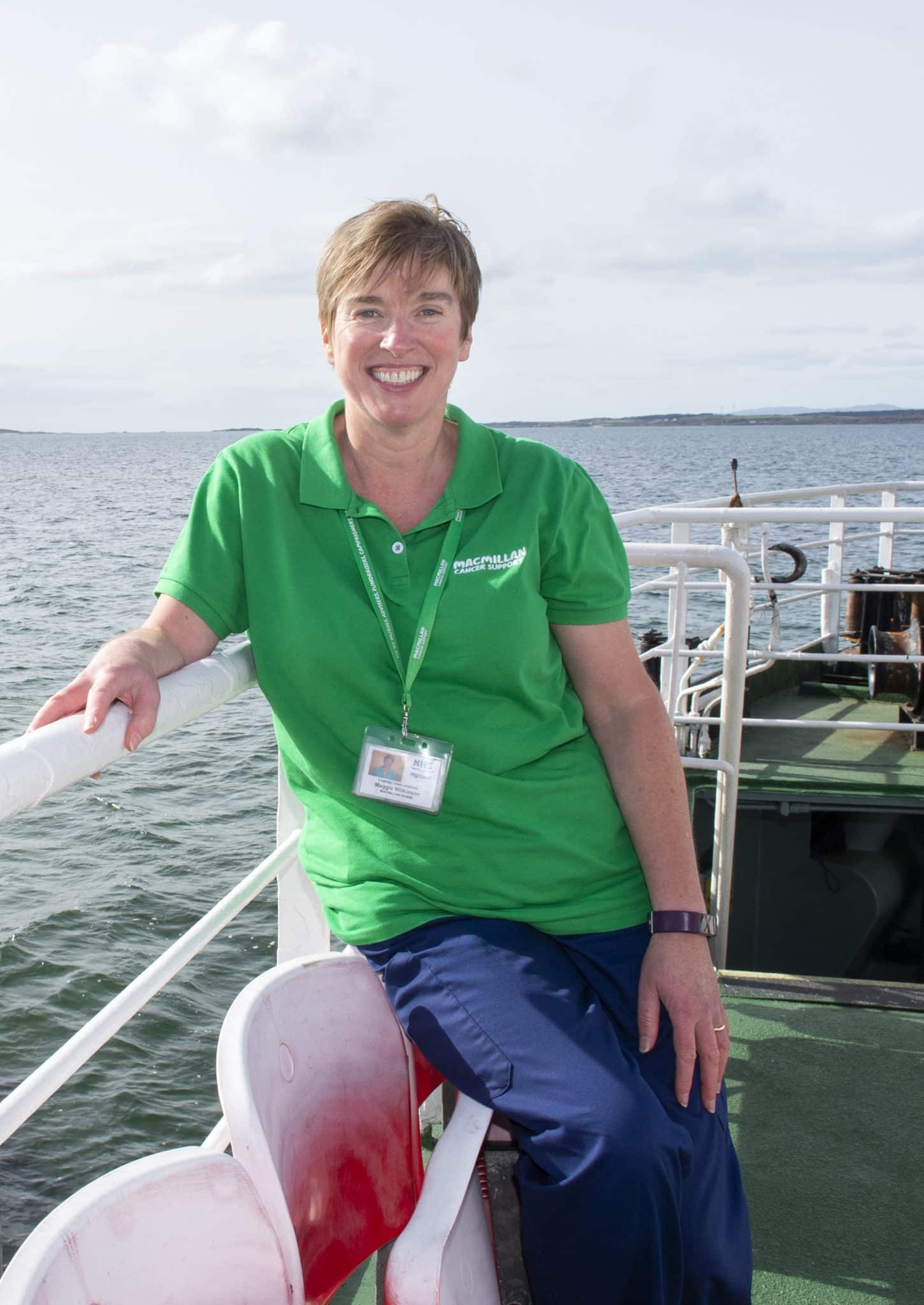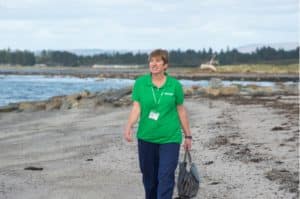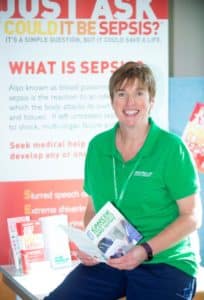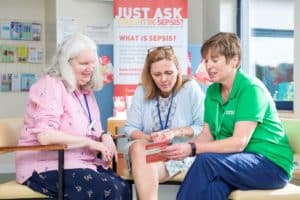Maggie Wilkieson
Macmillan Nurse
Campbeltown

I live on the island of Gigha and travel by ferry to Campbeltown where I work as Community Macmillan Clinical Nurse Specialist, caring for people in their homes as well as in our local community hospital. My ‘patch’ is almost the whole of the narrow peninsula of Kintyre, plus the Island of Gigha, with a total population around 9,000 people. I am extremely lucky to live and work in such fantastic surroundings, obviously loving Gigha but Kintyre too, the place where I was born and brought up. I meet people at various stages of their illness; my main work however is supporting those who require palliative and end of life care, a role in which I feel both honoured and humbled to share with patients and their families.
 I trained in Glasgow as a nurse and joined the air ambulance team, gaining my ‘wings’ and flying to remote, rural areas transporting people back to Glasgow. I went on to study midwifery and was fortunate an opportunity arose as community nurse/midwife on Gigha. Despite originating from Kintyre I didn’t anticipate the additional remoteness of an island setting and subsequent challenges of working on a non-doctor island. My mentor there was a Queen’s Nurse, she was an amazing person to work beside. A real ‘doer’ she moulded the service to what the community really needed. She was such a motivating person, a real inspiration to me. She supported me (as did the local fishermen who regularly got me home) whilst I undertook additional education at university to equip me better for this varied role. From this I moved to district nurse team lead on the mainland, which I did for seven years before taking my current job in 2007. In total, I’ve been working in community nursing for 26 years and consider myself very lucky to be doing a job I love.
I trained in Glasgow as a nurse and joined the air ambulance team, gaining my ‘wings’ and flying to remote, rural areas transporting people back to Glasgow. I went on to study midwifery and was fortunate an opportunity arose as community nurse/midwife on Gigha. Despite originating from Kintyre I didn’t anticipate the additional remoteness of an island setting and subsequent challenges of working on a non-doctor island. My mentor there was a Queen’s Nurse, she was an amazing person to work beside. A real ‘doer’ she moulded the service to what the community really needed. She was such a motivating person, a real inspiration to me. She supported me (as did the local fishermen who regularly got me home) whilst I undertook additional education at university to equip me better for this varied role. From this I moved to district nurse team lead on the mainland, which I did for seven years before taking my current job in 2007. In total, I’ve been working in community nursing for 26 years and consider myself very lucky to be doing a job I love.

My job has evolved over the past twelve years, comprising mainly of a clinical role, but also leadership, service development, community engagement and education. As a Macmillan nurse, I am educated to Masters level, and I have additional post graduate qualifications in prescribing, clinical assessment, education and leadership. Given our rurality, it is essential I keep up with current developments and am fortunate to have great links with really supportive colleagues in Glasgow and Inverness, enabling me to aid decision making locally. It is important that those going through difficult times in their life are being cared for by clinicians who are confident and well educated, allowing them to feel safe in our care. Relationships are very important during these difficult times and my aim is to be able to guide, advise, inform and support where I can. When you are breaking news to people that is very difficult to hear, they look for you to support them, and If you can sit with someone who is in a very distressed state and make a difference, then that is something that is hugely important to me. I’ve acquired many skills over the years but being present with someone in that moment when they don’t have any idea where to turn is something I hope makes me of real value to them, to truly make the difference.
 I see my role very much as being an advocate for my patients and the wider community and as such have a responsibility to recognise where services can be improved. I have led on various projects that have positively impacted on patientcare but forefront currently is work I have been involved in to obtain a blood analyser to assist in early detection of sepsis. People undergoing anti-cancer treatments can be at particular risk of sepsis and prior to the purchasing of this equipment, if there was a suggestion of sepsis, they were immediately transferred to Glasgow. This is particularly gruelling for those already fatigued, often frail. Evidencing the impact, I was able to demonstrate a need to purchase an analyser which can assist in the early detection of sepsis and subsequently enable better management of this life-threatening condition. I am so excited about this – early detection is important in remote and rural areas as time is critical. I was in a very privileged position where I could see first-hand the immense impact travelling to Glasgow had on those very fatigued, and it was essential to pursue an alternative solution for this group of patients.
I see my role very much as being an advocate for my patients and the wider community and as such have a responsibility to recognise where services can be improved. I have led on various projects that have positively impacted on patientcare but forefront currently is work I have been involved in to obtain a blood analyser to assist in early detection of sepsis. People undergoing anti-cancer treatments can be at particular risk of sepsis and prior to the purchasing of this equipment, if there was a suggestion of sepsis, they were immediately transferred to Glasgow. This is particularly gruelling for those already fatigued, often frail. Evidencing the impact, I was able to demonstrate a need to purchase an analyser which can assist in the early detection of sepsis and subsequently enable better management of this life-threatening condition. I am so excited about this – early detection is important in remote and rural areas as time is critical. I was in a very privileged position where I could see first-hand the immense impact travelling to Glasgow had on those very fatigued, and it was essential to pursue an alternative solution for this group of patients.